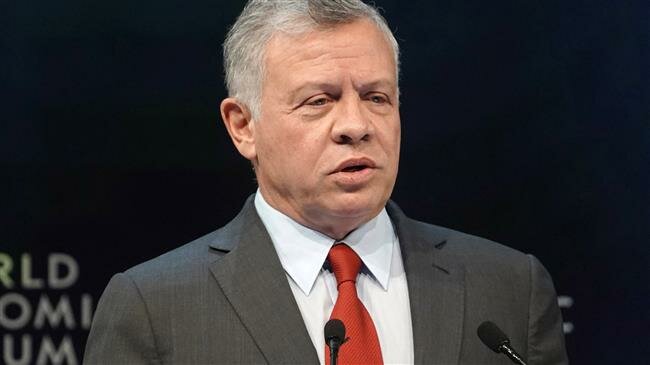Alwaght- Jordanian King ordered a review of his country’s multi-billion-dollar deal to import natural gas from the Israeli-occupied territories.
The London-based and Arabic-language Asharq al-Awsat newspaper, citing senior Jordanian political sources, reported that the king Abdullah II made the decision “in a technical report that examines Jordan’s interests from the continuation or the freezing of the agreement.”
Khaled Bakkar, the head of the finance committee in the Jordanian parliament, said the gas deal apart from being “blatant normalization” with the Israeli regime, is “economically weak” based on the feasibility studies.
He stressed that Jordan’s energy production surpassed the country’s needs, and the import of Israeli gas was only for the benefit of the Tel Aviv regime.
On September 26, 2016, Jordan’s National Electric Power Company signed a 10-billion-dollar deal with US-based Noble Energy and Israeli partners, which will tap the Leviathan natural gas field in the Mediterranean Sea off the coast of Israel for the supply of approximately 1.6 trillion cubic feet of natural gas, or 300 million cubic feet per day (mcf/d), over a 15-year term. Production is expected to begin around 2019 or 2020.
On March 26, members of Jordan’s parliament called for the cancellation of the gas deal with Israel during a parliamentary session closed to the public.
House Speaker Atef Tarawneh stated that all sectors of the society and members of parliament utterly reject Jordanian electricity company agreement to buy Israeli natural gas.
Several legislators argued that the multi-billion-dollar deal violates Article 33, section two of the Jordanian constitution, which states: “Treaties and agreements which entail any expenditures to the Treasury of the State or affect the public or private rights of Jordanians shall not be valid unless approved by the parliament; and in no case shall the secret terms in a treaty or agreement be contrary to the overt terms.”
Lawmaker Saddah al-Habashneh said the deal was unconstitutional, stressing that members of parliament were not given access to read what he called the “secret” deal.
“Why are they hiding it? It’s a clue that there is something. It is totally rejected,” he commented.
Habashneh then demanded the deal be scrapped along with Jordan’s peace accord with Israel – known as Wadi Araba Treaty and signed on October 26, 1994.
“We are calling for the Wadi Araba agreement to be dropped. What is peace when they’re attacking Gaza?” the parliamentarian said.
“And with yesterday’s recognition of the Golan Heights, what’s left? We want dignity,” he pointed out.
On March 25, US President Donald Trump signed a proclamation, formally recognizing Israel's sovereignty over the Golan Heights. The announcement came as Israeli Prime Minister Benjamin Netanyahu visited the White House.
The Syrian Ministry of Foreign Affairs and Expatriates, in a statement, called the US decision a “blatant attack on the sovereignty and territorial integrity” of Syria.
“The liberation of the Golan by all available means and its return to the Syrian motherland is an inalienable right,” according to the statement carried by Syria’s official news agency SANA, which added, “The decision ... makes the United States the main enemy of the Arabs.”
The Arab League also condemned the move, saying "Trump's recognition does not change the area's status."
Iran, Iraq, Russia and Turkey also condemned the US move.
Israel seized the Golan Heights from Syria after the 1967 Six-Day War and later occupied it in a move that has never been recognized by the international community. The regime has built dozens of settlements in the area ever since and has used the region to carry out a number of military operations against the Syrian government.



























